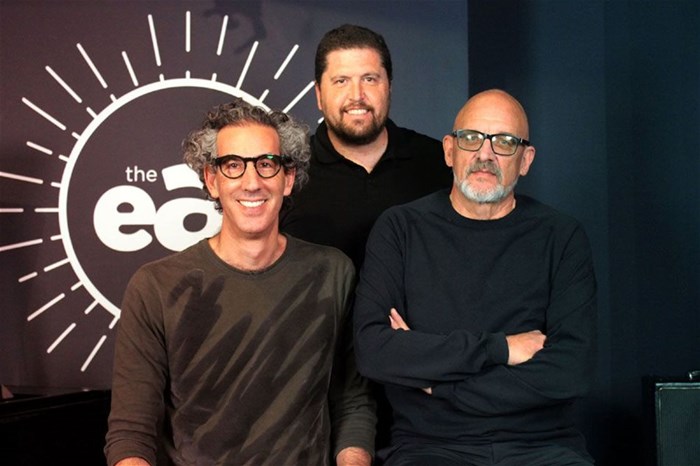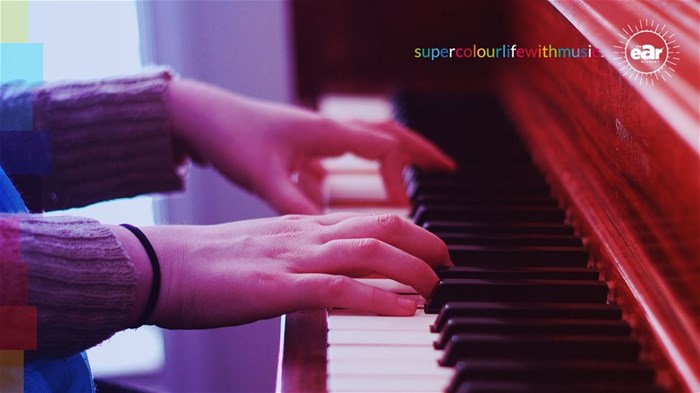With South Africa's education system in a crisis, the need continues to address issues of inequality and accessibility regardless of a student's background and socio-economic status. However, over the past decade, there have been ongoing efforts to improve music education in the country and this has resulted in some positive developments.

Founder of The eAr Academy, Rus Nerwich, Greg Krupp, and Hein van de Geyn. Image supplied
At one time, music education in South Africa faced various challenges that included limited funding and resources, a lack of trained music teachers, and a greater focus on academic subjects over the arts. Additionally, there was limited access to musical instruments and facilities, particularly in rural and disadvantaged areas.
With the rise of e-learning, in comes The eAr Academy, a highly inclusive and accessible, digitally enabled model that is challenging archaic legacy approaches to music education, eroding conventional boundaries, and showing that musical excellence can be effectively transferred digitally.
According to Rus Nerwich, celebrated musician and co-founder of The eAr Academy, "In recent years the international online music education arena has boomed. Informal, unstructured home-made YouTube content as well as gamified music learning platforms - made to pull people in - are to be found in abundance. Additionally, there has been a growing recognition of the importance of music education in promoting social and emotional development, as well as in supporting academic achievement."
Innovative music education offering
The academy's innovative offering draws a comprehensive toolset for music education – including tuition, sheet music, inspiration, and handy tools - into a single hub easily accessible on almost any mobile phone, tablet, or laptop - a move away from exclusive and expensive formal tuition.
The traditional approach to teaching music is often costly, rigidly tied to classical music conventions, and can be dogmatic and become dispassionate. Practical constraints such as time for lessons, and availability of trained teachers also limit the genres and instruments that most school learners can explore.
Overly competitive and intimidating to youngsters, the legacy approach has resulted in an unbalanced scenario where many start to learn music during primary school, and then stop their musical learning in high school. Few ever progress through to university-level music institutions, or go on to work as professional musicians.
"There is a real need for more broad music learning platforms that take learners from beginner to intermediate and even advanced levels. It is obvious that these platforms will be ideal to integrate into school systems that are anyhow going hybrid, and which often have serious financial constraints when it comes to servicing students in the traditional one-on-one model." says Nerwich.
Curated and crafted music education
Together with Hein Van de Geyn, co-founder and educational director at the academy, the duo curated and crafted the best of what they’ve learned over decades of collective music education and then added what they felt was missing.

Image supplied
"By incorporating seven complementary facets of music, we created a more comprehensive curriculum. By introducing Shedding Sessions (guided practice sessions) and backing tracks, we have made practising richer and more rewarding. We also did what centuries-old wisdom previously couldn’t: use tech to help teach, putting it all together in a way that’s immersive, innovative and intriguing. We know this will help teachers to teach more completely, and students to play more confidently." notes Nerwich.
New ways of learning and teaching
With ways of learning changing, teaching has had to change too.
Comments Nerwich, "Music teachers can adapt to the progression happening in music education by staying up-to-date with the latest trends and technologies in the industry. This can involve attending professional development workshops and collaborating with other music educators to share ideas and best practices. Additionally, music teachers can incorporate a wider range of musical styles and cultures into their curriculum to promote diversity and inclusivity, and use technology to enhance their teaching and engage students."
It's also important for music teachers to be flexible and adaptable to changing student needs and interests, and to continuously evaluate and improve teaching methods.
"Through The eAr Academy, teachers are invited to rethink the traditional approach by enabling their students to make more productive use of time between lessons. This is a transition from the many lonely hours students spend trying to integrate what has been taught in lessons to the experience of feeling supported and guided between lessons, improving the result for both teacher and student. This support is achieved by providing backing tracks and informative videos. This is not only a game-changer for the students, but will be a big inspiration to the teachers," notes Nerwich.
Going forward, the music industry can make music education more accessible by leveraging technology to create online resources and platforms that allow students to learn from anywhere, at any time. This can include online music lessons, tutorials, and interactive tools that enable students to practise and develop their skills.
The music industry can also partner with schools and educational institutions to provide funding and resources for music programmes, and offer mentorship and internship solutions that give students hands-on experience in the industry.
Additionally, the music industry can support initiatives that promote diversity and inclusivity in music education, and work to break down barriers to access for underrepresented communities.






![Today, Halo and Demographica announce a new specialist agency, Second Rodeo]], headed up by Mike Stopforth (left). Dean Oelschig, managing partner and founder of Halo (right) says they will work as a group but ultimately, each agency will be an individual specialist](https://biz-file.com/c/2505/772543-240x130.jpg?2)































![Today, Halo and Demographica announce a new specialist agency, Second Rodeo]], headed up by Mike Stopforth (left). Dean Oelschig, managing partner and founder of Halo (right) says they will work as a group but ultimately, each agency will be an individual specialist](https://biz-file.com/c/2505/772543-64x64.jpg?2)








